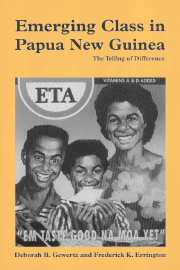Book contents
- Frontmatter
- Contents
- List of illustrations
- Acknowledgments
- Introduction: the twists and turns of difference
- 1 The middle class the (new) Melanesian way
- 2 How the grass roots became the poor
- 3 The realization of class exclusions
- 4 The hidden injuries of class
- 5 The problem(s) of the poor
- 6 Class and the definition of reasonability
- Conclusion: on dark nights of the soul
- Notes
- References
- Index
4 - The hidden injuries of class
Published online by Cambridge University Press: 03 December 2009
- Frontmatter
- Contents
- List of illustrations
- Acknowledgments
- Introduction: the twists and turns of difference
- 1 The middle class the (new) Melanesian way
- 2 How the grass roots became the poor
- 3 The realization of class exclusions
- 4 The hidden injuries of class
- 5 The problem(s) of the poor
- 6 Class and the definition of reasonability
- Conclusion: on dark nights of the soul
- Notes
- References
- Index
Summary
Desiring the unattainable
We have been demonstrating the effects of a system of incommensurate differences on the lives of Papua New Guineans – both on members of the middle class and on those of the grass roots, increasingly defined (by SWIT-like rhetorics) as the blameworthy poor. In the last chapter, we conveyed the wrenching consequences of exclusion on one of our Chambri friends, as he patrolled the margins of middle-class sociality seeking, unsuccessfully, his due. In this chapter we continue to portray – to embody – the hidden (and not so hidden) injuries of class exclusion. The story we tell of Godfried Kolly's attempt to achieve middle-class acceptance – to achieve what was, in effect, a glory day of entrepreneurial success so as to win friends – may be even more telling of contemporary social processes in Papua New Guinea than Michael's. Perhaps because Godfried was a town dweller, his efforts were less directed toward defying and challenging class distinctions than toward accommodating to their existence. Godfried's story teaches us, in other words, what happens to the poor when class has become a fait accompli.
To understand the social and economic dimensions of Godfried's entrepreneurial efforts in capitalist Wewak, we begin this chapter with a reference to another, earlier and more durable global emissary than the multicultural, postcolonial Tiger Woods – to James Leahy, one of the initial white explorers to engage with Papua New Guinea Highlanders. Both Leahy and Woods provide informative contrasts to Godfried, ones which, we think, clarify well the (often) invidious nature of the transformations within a global economy of a system of commensurate to one of incommensurate differences.
- Type
- Chapter
- Information
- Emerging Class in Papua New GuineaThe Telling of Difference, pp. 84 - 101Publisher: Cambridge University PressPrint publication year: 1999



